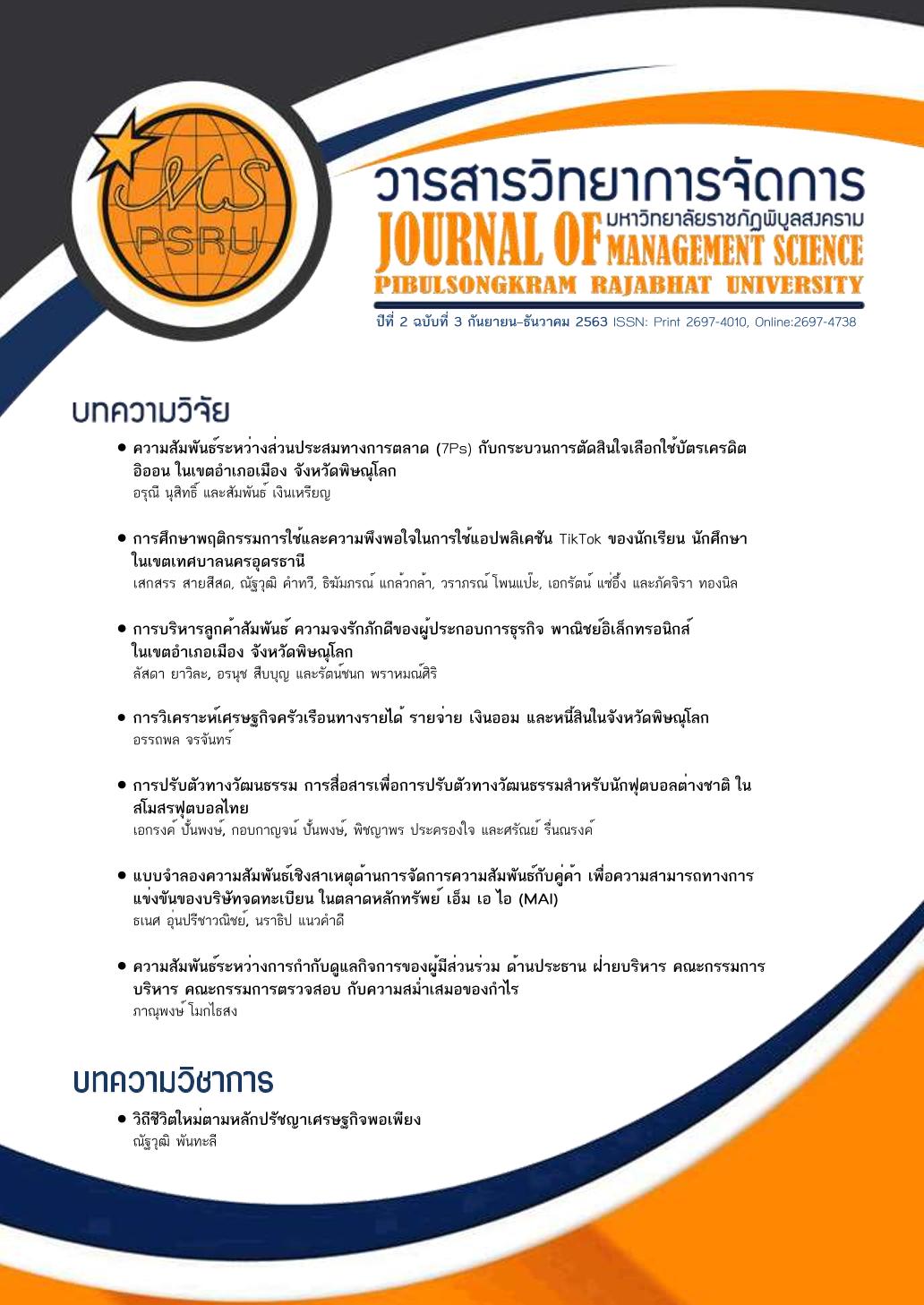แบบจำลองความสัมพันธ์เชิงสาเหตุด้านการจัดการความสัมพันธ์กับคู่ค้า เพื่อความสามารถทางการแข่งขันของบริษัทจดทะเบียน ในตลาดหลักทรัพย์ เอ็ม เอ ไอ (MAI)
คำสำคัญ:
ความสัมพันธ์กับคู่ค้า, ความสามารถทางการแข่งขัน, ตลาดหลักทรัพย์ เอ็ม เอ ไอบทคัดย่อ
การศึกษานี้มีวัตถุประสงค์เพื่อวิเคราะห์แบบจำลองความสัมพันธ์เชิงสาเหตุด้านการจัดการความสัมพันธ์กับคู่ค้าที่ส่งผลต่อความสามารถทางการแข่งขันของบริษัทจดทะเบียนในตลาดหลักทรัพย์ เอ็ม เอ ไอ (MAI) เป็นการวิจัยเชิงสำรวจ โดยอาศัยแบบสอบถามในการเก็บข้อมูลจากผู้ประกอบการธุรกิจที่จดทะเบียนในตลาดหลักทรัพย์ เอ็ม เอ ไอ (MAI) จำนวน 123 ราย โดยอาศัยการสุ่มตัวอย่างแบบชั้นภูมิ ทำการวิเคราะห์ปัจจัยองค์ประกอบเชิงยืนยัน (Confirmatory Factor Analysis) และการวิเคราะห์แบบจำลองสมการโครงสร้าง (Structural Equation Modeling) ผลการศึกษา พบว่า (1) แบบจำลองมีความสอดคล้องกับข้อมูลเชิงประจักษ์ โดยพิจารณาจากค่าสถิติประเมินความกลมกลืนของตัวแบบกับข้อมูลเชิงประจักษ์ (Chi-Square = 37.652, df = 21, Chi-square/df = 1.793, P-value = 0.123, RMR = 0.160, GFI = 0.963, RMSEA = 0.045 และ CFI = 0.988) และ (2) อิทธิพลด้านการจัดการความสัมพันธ์กับคู่ค้าที่มีต่อความสามารถทางการแข่งขันของบริษัทจดทะเบียนในตลาดหลักทรัพย์ เอ็ม เอ ไอ (MAI) มีค่าเท่ากับ 0.39
เอกสารอ้างอิง
ตลาดหลักทรัพย์ เอ็ม เอ ไอ. (2563). พันธกิจและวิสัยทัศน์. สืบค้น 20 พฤศจิกายน 2563, จาก https://www.set.or.th/mai/th/about/vision.html
ตลาดหลักทรัพย์ เอ็ม เอ ไอ. (2564). โครงสร้างการจัดกลุ่มอุตสาหกรรมในตลาดหลักทรัพย์ เอ็ม เอ ไอ. สืบค้น 22 พฤศจิกายน 2563, จาก https://www.set.or.th/mai/th/company/industry_group_p1.html.
ปิยารมย์ ปิยะไทยเสรี. (2561). IPO Roadmap เส้นทางสู่การเป็นบริษัทจดทะเบียน. กรุงเทพฯ: ศูนย์ส่งเสริมการพัฒนาความรู้ตลาดทุน (TSI).
Bimha, H., Hoque, M., & Munapo, E. (2020). The impact of supply chain management practices on industry competitiveness: A mixed-methods study on the Zimbabwean petroleum industry. African Journal of Science, Technology, Innovation and Development, 12(1), 97-109.
Burnes, B., & Dale, B. G. (1998). Working in partnership: Best practice in customer-supplier relations. Gower Publishing, Ltd.
Butt, A. S., Ahmad, A. B., & Shah, S. H. H. (2020). Knowledge hiding in a buyer‐supplier relationship: A pilot study. Knowledge and Process Management, 27(4), 272-279.
Chaithanapat, P., & Rakthin, S. (2021). Customer knowledge management in SMEs: Review and research agenda. Knowledge and Process Management, 28(1), 71-89.
Cronbach, L. J. (1970). Essentials of Psychological Testing. New York: Harper & Row.
Fidel, P., Schlesinger, W., & Esposito, E. (2018). Effects of customer knowledge management and customer orientation on innovation capacity and marketing results in SMES: The mediating role of innovation orientation. International Journal of Innovation Management, 22(07), 1850026–1850055. doi:10.1142/S136391961850055X.
Gallegos, J. F. D. C., Salvador Durand, A., & Soria Gomez, E. (2020). Organizational Innovation and Tech Innovation Persistence. Journal of technology management & innovation, 15(3), 52-61.
Gyemang, M., & Emeagwali, O. (2020). The roles of dynamic capabilities, innovation, organizational agility and knowledge management on competitive performance in telecommunication industr. Management Science Letters, 10(7), 1533-1542.
Haider, S. A., & Kayani, U. N. (2020). The impact of customer knowledge management capability on project performance-mediating role of strategic agility. Journal of Knowledge Management, 25(2), 298-312.
Hair, J.F., Black, W.C., Babin, B.J. & Anderson, R.E. (2010). Multivariate Data Analysis. (7th ed.). New York: Pearson
Jennex, M. E. (Ed.). (2020). Knowledge Management, Innovation, and Entrepreneurship in a Changing World. IGI Global.
Jo, H. J., Connerton, T., & Kim, H. J. (2020). Dynamic Outsourcing Development for Sustainable Competitive Advantage in a High-Tech Backend Semiconductor Equipment Firm. Sustainability, 12(1), 155.
Lambert, D. M. (2008). Supply chain management: processes, partnerships, performance. Supply Chain Management Inst.
Lambert, D.M. & Schwieterman, M.A. (2012) Supplier Relationship Management as a Macro Business Process. Supply Chain Management: An International Journal, 17(3), 337-352.
Mentzer, J. T., DeWitt, W., Keebler, J. S., Min, S., Nix, N. W., Smith, C. D., & Zacharia, Z. G. (2001). Defining supply chain management. Journal of Business logistics, 22(2), 1-25.
Migdadi, M. M. (2020). Knowledge management, customer relationship management and innovation capabilities. Journal of Business & Industrial Marketing, 36(1), 111-124.
Oduro, S., Nyarku, K. M., & Gbadeyan, R. A. (2020). Supplier relationship management and organizational performance of hospitals in an emerging economy context. Journal of Modelling in Management, 15(4), 1451-1478.
Oliver, R. K., & Webber, M. D. (1982). Supply chain management: Logistics catches up with strategy. In M. Christopher (Ed.), Logistics: The strategic issues. London: Chapman & Hall.
Opaleye, M. A., Ojelade, M. O., & Aremu, A. B. (2020). Effects of Supplier Relationship Management Practices on Performance of Quoted Food and Beverage Firms in Nigeria. IIARD International Journal of Economics and Business Management, 6(2), 12-28.
Pahurkar, R. N., Sangvikar, B. V., Khadke, K., & Kolte, A. (2020). An Exploratory Study of Important Dimensions in Strengthening Buyer-Supplier Relationship. International Journal on Emerging Technologies, 11(2), 803-810.
Patrucco, A. S., Moretto, A., Luzzini, D., & Glas, A. H. (2020). Obtaining supplier commitment: antecedents and performance outcomes. International Journal of Production Economics, 220, 107449.
Rovinelli, R. J., & Hambleton, R. K. (1977). On the use of content specialists in the assessment of criterion-referenced test item validity. Dutch Journal of Educational Research, 2, 49-60.
Schermelleh-Engel, K., Moosbrugger, H., & Muller H. (2003). Evaluating the fit of structural equation models: tests of significance and goodness-of-fit models. Methods of Psychological Research Online, 8, 23-74.
Tseng, S. M. (2014). The impact of knowledge management capabilities and supplier relationship management on corporate performance. International Journal of Production Economics, 154, 39-47.
Tyndall, G. R. (1988). Supply-chain management innovations spur long-term strategic retail alliances. Marketing News, 22(26), 10.
Van Hoek, R. I., Harrison, A., & Christopher, M. (2001). Measuring agile capabilities in the supply chain. International Journal of Operations & Production Management.
Van Hoek, R., Sankararaman, V., Udesen, T., Geurts, T., & Palumbo-Miele, D. (2020). Where we are heading and the research that can help us get there–Executive perspectives on the anniversary of the Journal of Purchasing and Supply Management. Journal of Purchasing and Supply Management, 26(3), 100621.
Wahyudi, R., Bangun, V. S., & Muda, I. (2021). Implementation of supplier relationship management on MSMES in Indonesia. International Journal of Multidisciplinary Research and Growth Evaluation, 2(1), 435-437.
Wen, X., Wu, G., Kang, Q., Wang, L., & Zeng, J. (2020). A study on customer knowledge management, inbound open innovation and firm performance. Human Systems Management, (Preprint), 1-13.
Yamane, Taro. (1973). Statistics: An Introductory Analysis. (3rdEd). New York: Harper and Row Publications.
ดาวน์โหลด
เผยแพร่แล้ว
รูปแบบการอ้างอิง
ฉบับ
ประเภทบทความ
สัญญาอนุญาต
ลิขสิทธิ์ (c) 2021 มหาวิทยาลัยราชภัฎพิบูลสงคราม

อนุญาตภายใต้เงื่อนไข Creative Commons Attribution-NonCommercial-NoDerivatives 4.0 International License.
บทความที่ได้รับการตีพิมพ์ในวารสารวิทยาการจัดการมหาวิทยาลัยราชภัฏพิบูลสงคราม เป็นลิขสิทธิ์ของ คณะวิทยาการจัดการ มหาวิทยาลัยราชภัฎพิบูลสงคราม บทความที่ลงพิมพ์ใน วารสารวิทยาการจัดการมหาวิทยาลัยราชภัฎพิบูลสงคราม ถือว่าเป็นความเห็นส่วนตัวของผู้เขียน คณะบรรณาธิการไม่จำเป็นต้องเห็นด้วย ผู้เขียนต้องรับผิดชอบต่อบทความของตนเอง



